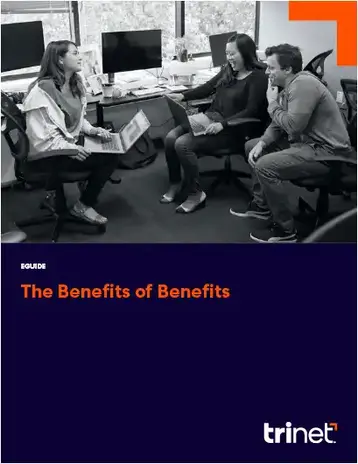
For employers and employees who wonder what is an FSA, we've got you covered. Understanding how a flexible spending account (FSA) works and the benefits it offers are key to maximizing its positive impact.
Here we'll explain what FSAs are, what kinds of eligible expenses they cover and answers to other frequently asked questions.
What is an FSA?
An FSA is an employer-sponsored benefit option similar to a savings account. It allows employees to save pre-tax dollars via payroll deductions to fund eligible out-of-pocket health care expenses.
FSAs are structured on an annual plan year. Employees must decide how much they will save in their healthcare FSA during open enrollment. The Internal Revenue Service (IRS) sets a contribution limit each year. For 2024, the contribution limit is $3,200.
Why offer FSAs to employees?
Offering flexible spending accounts to employees provides compelling advantages to both sides. Employees benefit in three significant ways.
Tax benefits
An FSA is a health savings account by which employees can sock away FSA money to pay for medical expenses like dental and vision expenses and prescription medications.
Since employees make contributions to an FSA health plan before taxes, they may also fall into a lower tax bracket which decreases their taxable income.
Cost savings
FSAs let employees avoid the income tax cost right off the bat. Using pre-tax dollars to pay for things like vision expenses helps their money go further and cover costs more easily.
Employers benefit, too!
Creates happy employees
A comprehensive benefits package ranks up there in importance with pay. Adding an FSA to the mix allows employees the opportunity to better control their health care expenses. Perks like this make the employee feel appreciated and well-compensated, motivating them to stay productive.
Elevates employer brand
Recruiting and hiring high-quality job candidates is challenging in a market as competitive as the current one. Robust benefits like health savings accounts can make your organization more attractive to potential new hires.
Types of flexible spending accounts
Numerous account types exist under the flexible spending account umbrella. Understanding the differences is essential. Employers can use this knowledge when deciding which option to offer. This insight also helps employees decide which plan suits them best.
Health care FSAs
A health care FSA covers what it sounds like it would: health expenses. Qualified health expenses, like copayments, medical equipment, diagnostic devices and over-the-counter drugs, can be paid from this account. The FSA Store features some surprising FSA eligible items like shoe insoles, facial lotion and Epsom salt.
Dependent care FSA
This type of FSA allows employees to save pre-tax money to cover dependent care costs. Common expenses dependent care FSAs pay for are daycare, care for elderly or disabled dependents, and before- and after-school programs.
For dependent care FSAs, the IRS limits annual contributions to $5,000 per household or $2,500 if married but filing separately. Children up to 13 years old and dependent relatives who are physically or mentally incapable of self-care meet the dependent care FSA eligibility requirements.
Lifestyle spending accounts
Different from a standard FSA, a lifestyle spending account is a taxable, employer-funded benefit designed to support employee health and wellness. They are chosen and funded entirely by the employer and they are taxable to employees. The IRS does not mandate eligible expenses for LSAs.
LSA expenses can help support employees’ physical, emotional and financial wellness needs. Physical needs may include weight loss programs, nutrition counseling and gym memberships. Emotional needs might be met with counseling services, meditation classes and personal development classes. Financial needs covered by LSAs might include student loan reimbursement, financial planning services and estate planning expenses.
Who is eligible to enroll in an FSA plan?
Most full-time employees are eligible to participate in an FSA if their employer offers health insurance. Employees who already have a health savings account (HSA) should not enroll in a health care FSA. They may still enroll in a dependent care FSA.
New employees become eligible for enrollment in the company’s FSA on the first of the month following the employee’s hire date.
Current employees can enroll during the initial enrollment period, during FSA open enrollment or due to a qualifying life event. For each, a predetermined timeline applies.
Employees ineligible for FSA enrollment
Some employees are not eligible to enroll in an FSA.
Though there are exceptions, self-employed employees and shareholders who own 2% or more in an S corporation, LLC, LLP, PC, sole proprietorship or partnership are generally ineligible for FSAs.
Employees with HSAs cannot enroll in an FSA. However, employees with HSAs can enroll in a child and elderly care FSA.
Fast facts: FSA FAQs
Since we receive many questions repeatedly, we composed a "frequently asked questions" list for your reference.
When can employees enroll in their company’s FSA plan?
Employees have four opportunities to enroll in their company’s flexible spending account plan:
- Within 30-60 days of the hire date (this varies by company).
- Surrounding a qualifying life event (QLE).
- During the company’s initial enrollment period.
- During FSA open enrollment.
Start dates for a new individual FSA plan differ for each of these opportunities. Generally, employees cannot use FSA funds before their start date.
When do health care FSA funds become available?
The annual contribution amount for a health care FSA is available to use at the beginning of the plan year. Employees pay back the funds incrementally through paycheck deductions for the rest of the plan year.
FSAs have a 90-day run-out period at the end of the year, within which employees can submit claims for expenses.
Preloading presents risks and rewards for the employer:
- Employees can use the entire amount before they’ve paid it back through deductions.
- The company cannot recover the funds if the employee is terminated before the balance is repaid.
- Any unused money remaining in the FSA at the end of the plan year is returned to the employer.
- If an employee is terminated before all funds are spent, the remaining funds are returned to the employer.
Employers may optionally offer a two-and-a-half-month extension at the end of the plan year when health care FSA funds can be spent. Or, account holders can roll over up to $610 of unused health care FSA funds into the next plan year.
How do employees use their FSA to pay at the doctor's office?
When using a flexible spending arrangement, the doctor’s office should bill the health insurance company directly.
Once the claim is processed, the employee receives credit for the payment of their deductible. They will then know the exact amount they have to pay out of pocket. Once they have this, they can use the funds from their account to pay the difference. Since the employee will have a copayment until they have met their deductible, they can use the account to make the copayment.
What happens to leftover funds?
FSAs are a use-it-or-lose-it plan, meaning that unused funds revert to the employer once the plan ends. Prior to that is a good time to schedule dental and vision appointments or anything that you haven't done during the year. Employees should make sure they don't lose unused funds by planning accordingly.
Now you know what an FSA is!
Understanding FSAs and their benefits is crucial for getting the most out of tax-advantaged accounts. With keen insight and a bit of planning on the part of their beneficiaries, these accounts offer lucrative, far-reaching advantages for employees and employers alike.
If you need more guidance in establishing or maintaining FSA plans, let's connect. A TriNet HR and benefits expert will lay out your options so you can make informed decisions.






